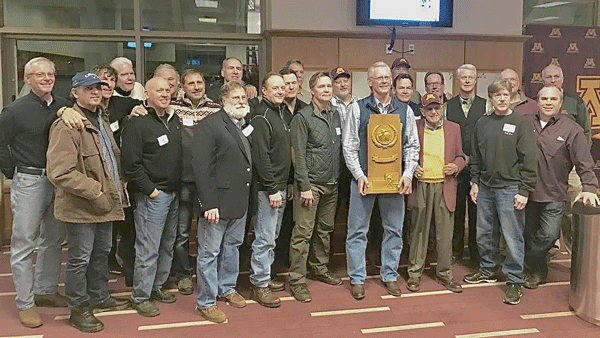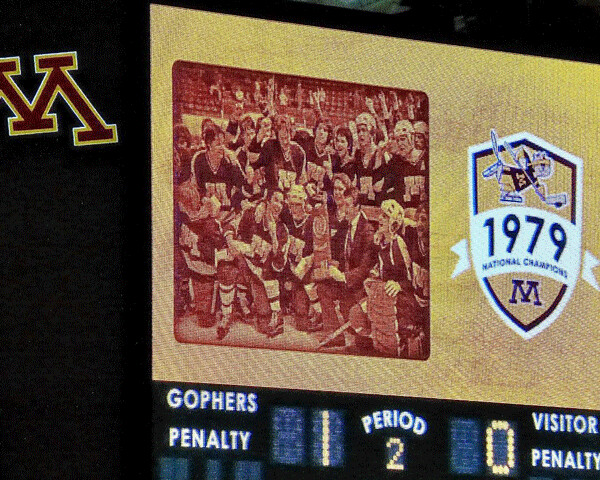Special Night Honors Brooks and 1979 Gopher Champs

“Time it was, and what a time it
was, it was…
a time of innocence, a time of
confidences.
Long ago, it must be…I have
a photograph…
Preserve your memories; they’re
all that’s left you.”
The legendary Paul Simon wrote those words as the preliminary to one of the great Simon and Garfunkel albums, and the words have stayed with me for several decades. The haunting little melody came back to me last Saturday night, after the unique opportunity to witness, close-up, the 40th reunion of the players from the 1978-79 University of Minnesota NCAA championship team.
This was a special team, and the memories they all can relate readily are rich ones that will last them all their lives.
I believe it was the best team in college hockey history, and a look at the evidence is that it was also the most competitive season ever in the WCHA, and therefore in college hockey. The Gophers had Steve Janaszak and Jim Jetland in goal; on defense, Billy Baker, Joe Baker, Peter Hayek, Mike Greeder, Bob Bergloff, Brian Zins, freshman Mike Ramsey, and Glen LeTourneau; forwards were freshman Neal Broten, Steve Christoff, Tim Harrer, Rob McClanahan, Eric Strobel, Phil Verchota, John Meredith, Don Micheletti, Dave Terwilliger, Brad Doshan, Kevin Hartzell, Steve Ulseth, and Jeff Teal.
It was fantastic that those players all came back to pay tribute to the third of three NCAA title teams coached by Herb Brooks. Working at the Minneapolis Tribune, I had covered all the Gopher teams Herbie coached, including the 1974, 1976 and 1979 championship teams, so I was very close to all those players. Still, it was a players-only gathering, with their wives, so it was doubly special to get invited as the only non-player.
I think I got to talk to every one of them, although it would have been more fun to have an hour to spend with each one. Rob McClanahan, for example, has a daughter who is a freshman defenseman at Dartmouth. I had no idea. Of course I knew Mike Ramsey from his days coaching with the Wild, and his son is a current Gopher. Dave Terwilliger still assists Curt Giles coaching Edina. Don Micheletti was the only no-show, apparently because of a business conflict. The only other one not present was Mike Greeder, a rugged defenseman who shockingly died of a heart attack several years ago, but was remembered fondly by everyone there.
Steve Janaszak, sporting a big, bushy beard now, was the all-NCAA tournament goaltender and most valuable player back then. We laughed about coming home on the flight from Detroit after the NCAA tournament, and as we walked up the corridor we learned that nobody had arranged for a bus to pick up the team. Joan was waiting to pick me up, and Janaszak and I were talking as we got to the terminal, so Joan and I gave him a ride back to campus. The rest of the players had to take cabs.
It was riveting to renew acquaintances with both of the unrelated Baker boys, and Verchota, and Ulseth, Christoff, Strobel — who had a stroke several years ago but has recovered — plus Bergloff and Zins, both of whole are in the car-selling business. John Perpich, another former Gopher who was an assistant coach, was there, taking a break from his job as an NHL scout. Patti Brooks, the unofficial den mother of all Herbie’s teams, was also there, with her daughter, Kelly, representing the family.
We all were seated together across the street to watch the Gophers fall 4-3 to Wisconsin, as part of an all-time Mariucci crowd of 10,686 fans — standing room only at Mariucci Arena. Judging by the ovations the players received when they were introduced on the ice after the first period, and during an autograph session up in the concourse during the second intermission, it would be safe to assume their presence was a major influence on the record turnout.

The 1979 title team was significant for various reasons. For one, they had lost the final game of the regular season to North Dakota, one night after they had beaten the Fighting Sioux 5-2 Friday to move within one point of the title. A Saturday victory would mean the WCHA title, but North Dakota led 3-2 in the final minute when Brooks pulled Janaszak for a sixth attacker. David Christian broke free at the open net, however, and punctuated the rivalry by skating in at top speed, then stopping abruptly at the crease before winding up to blast the puck into the empty net.
In the playoffs, Minnesota beat nemesis UMD 2-1 and 6-3 in the total-goal series. UMD had lost 5-4 in overtime and won 5-4, then the teams tied 6-6 and UMD won 6-1 in a later series. The Gophers still had to win a play-in game to make the Final Four, and they did that, knocking off Bowling Green 6-3. That first round was at Williams Arena (later renamed Mariucci), so it was off to Detroit’s Olympia where the Gophers beat New Hampshire 4-3 in the semifinals, then take down the Fighting Sioux 4-3 in the final.
North Dakota had 10 or 12 players who went on to NHL careers, including all-WCHA center Kevin Maxwell, Christian, and Mark Taylor, and a defense led by Howard Walker and Marc Chorney, plus All-America goalie Bob Iwabuchi. UMD, with incredible talent in Mark Pavelich, Curt Giles, John Harrington and others, tied Wisconsin for third, and the Badgers had Mark Johnson leading the way with defensemen Bob Suter and Theran Welsh. Fifth was Notre Dame, sixth was Denver, loaded with pro-caliber defense, while giant All-WCHA winger Gord Salt led sixth-place Michigan Tech, and seventh-place Colorado College had Dave Delich, the WCHA’s leading scorer. Michigan State was seventh and Michigan eighth.
It was fantastic that those players all came together to pay tribute to the third of three NCAA title teams coached by Herb Brooks. I had covered all the Gopher teams Herbie coached, including the 1974, 1976 and 1979 championship teams, so I was very close to all those players. Still, it was a players-only gathering, with heir wives, so it was doubly special to get invited as the only non-player.
Then we all were seated together as part of an all-time Mariucci crowd of 10,686 fans — standing room only at Mariucci Arena. Judging by the ovations the players received when they were introduced on the ice after the first period, and during an autograph session up in the concourse during the second intermission, it would be safe to assume their presence was a major influence on the record turnout.
Each of the Gopher championship teams was different, and Verchota, Billy Baker, Joe Baker and Janaszak all had played on the 1976 title team. But in no other league was there the amazing talent bristling at every WCHA city, only Bill Baker made first team all-WCHA, with Steve Christoff on the second team, and the All-America team was Iwabuchi in goal, Baker and Giles on defense, and Kevin Maxwell, Mark Johnson and Mark Pavelich up front.
But if the Gophers were snubbed on the all-WCHA and All-America teams, they made up for it all at the NCAA, which they won dramatically over North Dakota in the Detroit Olympia in a 4-3 verdict where the winning goal was scored by freshman Neal Broten, Janaszak was named most valuable player. Broten’ss game-winner is one of the most replayed goals in Gopher history. On his rush, he beat two defensemen, skirting wide to the left to get around the second one, but as he tried to regain possession of the puck it slid just ahead, and he saw All-WCHA and All-America goaltender Iwabuchi racing out from the goal to try to get it. In an instant, Broten made a dive for the puck, so Iwabuchi went into a broad-slide to smother any shot. But Broten stabbed at the puck as he flew horizontal, and sent an improbable chip shot up and over Iwabuchi on a trajectory that landed in the goal as Broten belly-flopped to the ice. Magnificent.
The ultimate prize came a year later, when Brooks invited a dozen Gophers to the following summer’s 80-player National Sports Festival, where he selected eight of them to follow him on his journey to the 1980 Winter Olympics and the unforgettable Miracle on Ice Gold Medal performance by Team USA.
Bill Baker’s favorite story is when Team USA was pushed through repeated post-game skating killer-drills by Brooks after they had struggled to tie Norway 2-2. It was well-portrayed in the movie “Miracle.” Baker said: “Everybody asks me if that really happened,” Baker laughs. “I tell them, it did happen, but those of us who were Gophers knew what was coming, because he used to do it to us every couple of weeks.”
Herbie would have gotten a big chuckle out of that. And typically, he could say: “Well, it worked!
